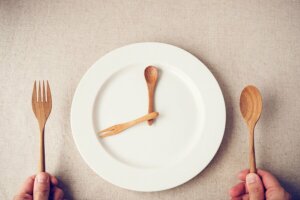Should You Eat Before Your Morning Training?

There’s a popular saying that breakfast is the most important meal of the day. If this were true, you wouldn’t even consider skipping it before your morning training. However, to understand it, we need to clear up some concepts. How important is breakfast? Where does the energy for a morning workout come from?
The history of breakfast
From an evolutionary point of view, breakfast is unnecessary and expendable. In the Paleolithic era, you wouldn’t think that there were set times for meals. Food revolved around hunting and gathering. In fact, humans were exposed to long periods of fasting, and their bodies adapted to it.
As civilizations began to develop, people started incorporating order into food. The origin of breakfast could be around the 19th century when jobs were physical and workers ate before starting the workday.
In the beginning, for breakfast, people used to eat meats with butter. Because they started suffering from indigestion, they started to eat unsweetened cereals instead. As a result of this, the Battle Creek Toasted Corn Flake Company appeared, now known as Kellogg’s.
As cereals gained popularity, they lost nutritional qualities. Then, they even became one of the main sources of added sugars.
Sources of energy
Glucose is the main source of energy for the body. However, you can still get by if you stop eating foods rich in carbohydrates. We’ll talk more about that in this next section.

After eating a meal, the food transforms into a simpler molecule to use and store it in the body. A small part of what you eat goes to energy production. Then, your body stores the rest for the future.
There are three macronutrients with different metabolic pathways: carbohydrates, fats, and proteins. Carbs, present in foods such as pasta, transform into glucose, and are stored in the liver and muscle as glycogen.
Meanwhile, the fats break down and are stored as triglycerides in adipose tissue. Finally, the proteins break down into amino acids. Although they aren’t stored, the liver and intestine retain amino acids for a short amount of time.
From all of that, although the main source of energy is carbs, the body has enough mechanisms to get energy without them.
What happens if you don’t eat carbs
When going through a period of prolonged fasting, the body adjusts to stay alive as long as possible. In this process, the body without carbohydrates uses the glycogen reserves in the liver for energy.
However, if you fast for longer and there isn’t enough stored glycogen, the energy source becomes fat. The transformation of fat into energy creates compounds called ketones. Here, your body gets energy. Now, what happens if you don’t eat before morning training?
Fasting before morning training: is it possible?
Actually, it all depends on the type of training and the intensity of the sport that you’re practicing. Although training on an empty stomach isn’t harmful, you need to keep in mind that if you increase the intensity and exercise for a long period of time, your performance will decrease.
Therefore, in high-intensity sports, if the goal of training is to improve performance, it’s not a good idea to skip breakfast before morning training. In these situations, a snack or light meal is a good idea, since it’ll replenish your stored glycogen.
For example, some circumstances where you don’t want to train on an empty stomach are:
- Intense CrossFit training.
- People who have double training sessions.
- Athletes who train more than one hour a day and want to improve performance.
- Endurance sports.
- Before a competition.

Beyond that, if the training is moderate intensity, training without breakfast isn’t a problem. In fact, your morning training might be more comfortable because your body doesn’t have anything to digest.
Final thoughts on skipping breakfast before morning training
The decision of whether or not to do morning training on an empty stomach has to be a personal decision that only you can make. In any case, planning this strategy with a nutritionist is always a good idea.
However, training on an empty stomach can have effects on fat loss or muscle mass gain because the body has to adapt to improve long-term performance.
There’s a popular saying that breakfast is the most important meal of the day. If this were true, you wouldn’t even consider skipping it before your morning training. However, to understand it, we need to clear up some concepts. How important is breakfast? Where does the energy for a morning workout come from?
The history of breakfast
From an evolutionary point of view, breakfast is unnecessary and expendable. In the Paleolithic era, you wouldn’t think that there were set times for meals. Food revolved around hunting and gathering. In fact, humans were exposed to long periods of fasting, and their bodies adapted to it.
As civilizations began to develop, people started incorporating order into food. The origin of breakfast could be around the 19th century when jobs were physical and workers ate before starting the workday.
In the beginning, for breakfast, people used to eat meats with butter. Because they started suffering from indigestion, they started to eat unsweetened cereals instead. As a result of this, the Battle Creek Toasted Corn Flake Company appeared, now known as Kellogg’s.
As cereals gained popularity, they lost nutritional qualities. Then, they even became one of the main sources of added sugars.
Sources of energy
Glucose is the main source of energy for the body. However, you can still get by if you stop eating foods rich in carbohydrates. We’ll talk more about that in this next section.

After eating a meal, the food transforms into a simpler molecule to use and store it in the body. A small part of what you eat goes to energy production. Then, your body stores the rest for the future.
There are three macronutrients with different metabolic pathways: carbohydrates, fats, and proteins. Carbs, present in foods such as pasta, transform into glucose, and are stored in the liver and muscle as glycogen.
Meanwhile, the fats break down and are stored as triglycerides in adipose tissue. Finally, the proteins break down into amino acids. Although they aren’t stored, the liver and intestine retain amino acids for a short amount of time.
From all of that, although the main source of energy is carbs, the body has enough mechanisms to get energy without them.
What happens if you don’t eat carbs
When going through a period of prolonged fasting, the body adjusts to stay alive as long as possible. In this process, the body without carbohydrates uses the glycogen reserves in the liver for energy.
However, if you fast for longer and there isn’t enough stored glycogen, the energy source becomes fat. The transformation of fat into energy creates compounds called ketones. Here, your body gets energy. Now, what happens if you don’t eat before morning training?
Fasting before morning training: is it possible?
Actually, it all depends on the type of training and the intensity of the sport that you’re practicing. Although training on an empty stomach isn’t harmful, you need to keep in mind that if you increase the intensity and exercise for a long period of time, your performance will decrease.
Therefore, in high-intensity sports, if the goal of training is to improve performance, it’s not a good idea to skip breakfast before morning training. In these situations, a snack or light meal is a good idea, since it’ll replenish your stored glycogen.
For example, some circumstances where you don’t want to train on an empty stomach are:
- Intense CrossFit training.
- People who have double training sessions.
- Athletes who train more than one hour a day and want to improve performance.
- Endurance sports.
- Before a competition.

Beyond that, if the training is moderate intensity, training without breakfast isn’t a problem. In fact, your morning training might be more comfortable because your body doesn’t have anything to digest.
Final thoughts on skipping breakfast before morning training
The decision of whether or not to do morning training on an empty stomach has to be a personal decision that only you can make. In any case, planning this strategy with a nutritionist is always a good idea.
However, training on an empty stomach can have effects on fat loss or muscle mass gain because the body has to adapt to improve long-term performance.
All cited sources were thoroughly reviewed by our team to ensure their quality, reliability, currency, and validity. The bibliography of this article was considered reliable and of academic or scientific accuracy.
- Nelson DL, Cox MM. 2015. Lehninger: princípios de bioquímica.
- Karen Van Proeyen; Karolina Szlufcik; Henri Nielens; Monique Ramaekers; Peter Hespel. 2011. Beneficial metabolic adaptations due to endurance exercise training in the fasted state. https://journals.physiology.org/doi/full/10.1152/japplphysiol.00907.2010
This text is provided for informational purposes only and does not replace consultation with a professional. If in doubt, consult your specialist.








